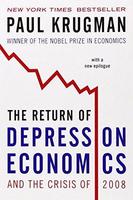The Return of Depression Economics and the Crisis of 2008
The Return of Depression Economics and the Crisis of 2008 is a non-fiction book by American economist and Nobel Prize winner Paul Krugman, written in response to growing socio-political discourse on the return of economic conditions similar to The Great Depression. The book was first published in 1999 and later updated in 2008 following his Nobel Prize of Economics. The Return of Depression Economics uses Keynesian analysis of past economics crisis, drawing parallels between the 2008 financial crisis and the Great Depression. Krugman challenges orthodox economic notions of restricted government spending, deregulation of markets and the efficient market hypothesis. Krugman offers policy recommendations for the prevention of future financial crises and suggests that policymakers "relearn the lessons our grandfathers were taught by the Great Depression" and prop up spending and enable broader access to credit. The first edition included an economic analysis of the Asian Financial Crisis and the Latin American debt crisis. The central concept of the book, as noted in the book's title, was a direct rejection of the public consensus that "the central problem of depression prevention has been solved", as stated by Robert Lucas in his presidential address to the American Economic Association.Following the shock of the Global Financial Crisis (GFC) from 2007-2009, Krugman published an updated version of his book including an analysis of the recent GFC in his second edition The Return of Depression Economics and the Crisis of 2008. In response to the GFC, Krugman expressed his dissatisfaction with modern macroeconomic policy in the New York Times article How Did Economists Get It So Wrong?, highlighting what he considered the failure of neoclassical economics (i.e., Robert Lucas and Eugene Fama's efficient market hypothesis). A similar sentiment is echoed in Depression Economics and the Crisis of 2008. Source: Wikipedia (en)
Editions
2- date of publication: 2009ISBN-13: 978-0-393-07101-6
In your inventory
In your friends' and groups' inventories
Nearby
Elsewhere
Work - wd:Q7760402

